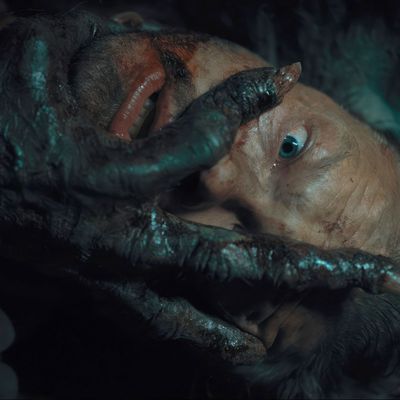
A movie like The Last Voyage of the Demeter must drive some members of the spoiler police nuts. It’s based, as an opening credit tells us, on a brief episode in Bram Stoker’s novel Dracula — a captain’s log from the doomed Russian schooner that carries the legendary vampire and his crates of Transylvanian earth from Romania to London. The film itself begins with the discovery of the corpse-filled ship on a dark and stormy night, before flashing back to the first days of its journey with an unsuspecting crew of hardened sailors. So we know the story, we know what’s in those mysterious boxes emblazoned with the image of a dragon, and we know just about everybody on the boat is going to meet an unsavory end.
But this is where a real filmmaker gets to show their chops. With the ending basically a foregone conclusion, they can’t hide behind the drip-drip-drip of narrative disclosure. The characters may not know what exactly they’re dealing with, but we do; pretend that we don’t and you’ll lose us. That means the suspense has to come from, yes, cleverly engineered scenes of pursuit and carnage but also from atmosphere and character, those noble virtues so many genre films nowadays skimp on.
The movie has certainly got atmosphere. Like a proper haunted ship, the Demeter moves through treacherous lashings of rain and seemingly endless gray mist, its lanterns feebly lighting the way. One wonders if Norwegian director André Øvredal (Trollhunter, Scary Stories to Tell in the Dark) has spent some time staring at J.M.W. Turner and George Philip Reinagle and Caspar David Friedrich paintings; the film’s mood of doomed romanticism suggests he has.
The despair outside reflects the desperation inside. The crew of sailors, led by veteran Captain Elliot (Liam Cunningham) and the haunted-eyed first mate, Wojchek (David Dastmalchian, who makes everything he’s in better), are themselves a mercenary lot, suspicious and cynical and impulsive. They’re eager to sail fast because there’s a bonus in it for them if the ship arrives early. Joining them on the voyage is a young, Cambridge-educated doctor, Clemens (Corey Hawkins), who is initially rejected because he’s too well dressed and his hands are not rough enough. But then he saves the captain’s young grandson Toby (Woody Norman) from getting crushed by a falling crate, and he’s invited onboard.
The film does set up a potentially intriguing philosophical debate between the curious, scientific-minded Clemens and the rough men around him. “I want to understand the world,” he tells them. “Perhaps it needs to be experienced,” comes the reply. The deck is stacked against him, of course; there is, after all, a vampire on the ship. As a bizarre, bald, fanged figure starts to appear to the crew in brief, half-imagined glimpses, the pigs and goats and chickens onboard are mysteriously torn open, and the rats disappear. (“A boat without rats? Such a thing is against nature!”) The crew discovers a half-dead Romanian stowaway (Aisling Franciosi) with suspicious marks on her neck, and soon enough she’s warning them about what’s going to happen. Watching Clemens try and insist that there must be material explanations for all these occurrences could have easily become annoying, but Hawkins brings to the character a touching sense of anxiety: We understand that he needs to believe in reason and science because that’s all he’s got in this world. You feel for the guy.
But enough about the characters. What truly distinguishes Last Voyage of the Demeter, beyond its thick atmosphere of dread, is its gleeful cruelty, the delicious mean streak with which it sets up its suspense set pieces and its kills. All too often, studio horror films — especially ones based on classic monsters — can feel a little too tame, too bland, partly as a result of efforts to broaden their appeal. Not this one. Last Voyage of the Demeter certainly isn’t afraid to go for the gore, and it isn’t afraid to do away with characters we assumed would be off-limits, often in the nastiest possible ways. The film is filled with delightfully savage surprises. And suddenly, in this most predetermined of movies, anything seems possible.
More Movie Reviews
- The Best Movie at Cannes This Year Is an Oddball Canadian Comedy
- Paolo Sorrentino’s Parthenope Is As Beguiling As It Is Alienating
- The Fall Guy Is a Funny, Romantic, Stunt-Filled Delight





